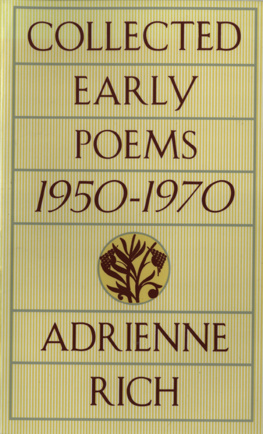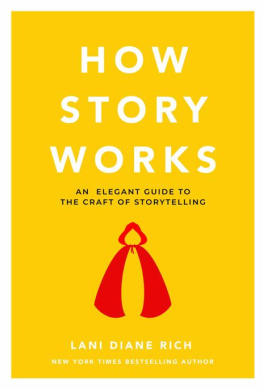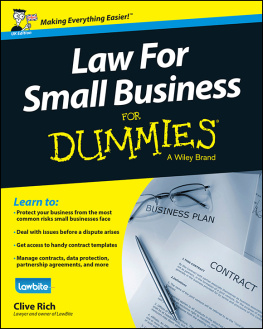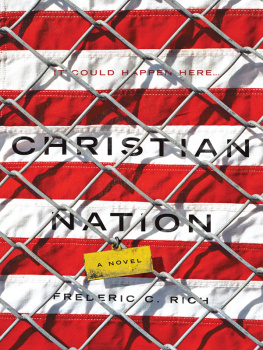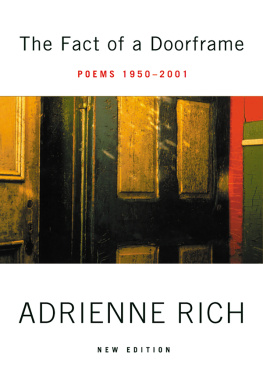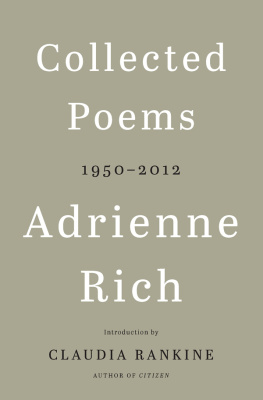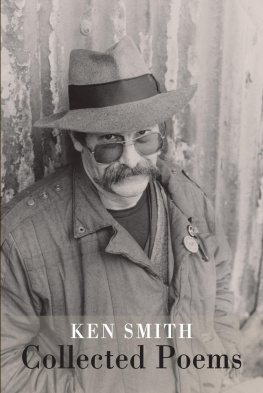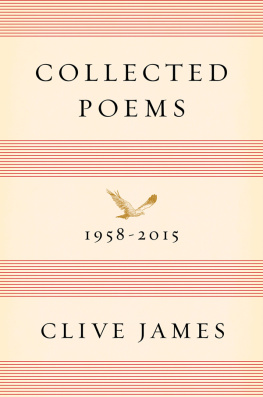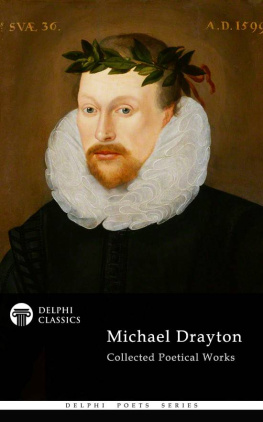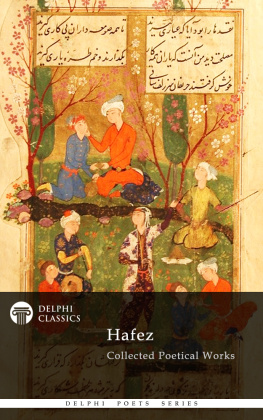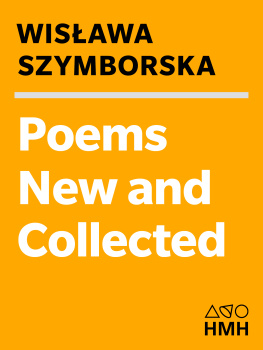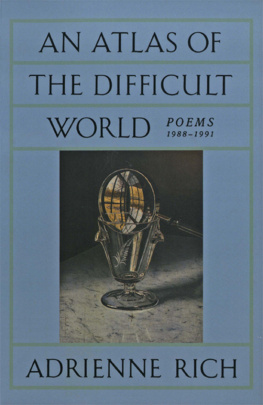
Also by Adrienne Rich
Tonight No Poetry Will Serve: Poems 20072010A Human Eye: Essays on Art and Society, 19972008Poetry & Commitment: An EssayTelephone Ringing in the Labyrinth: Poems 20042006The School Among the Ruins: Poems 20002004What Is Found There: Notebooks on Poetry and PoliticsThe Fact of a Doorframe: Poems 19502000Fox: Poems 19982000Arts of the Possible: Essays and ConversationsMidnight Salvage: Poems 19951998Dark Fields of the Republic: Poems 19911995Collected Early Poems 19501970An Atlas of the Difficult World: Poems 19881991Times Power: Poems 19851988Blood, Bread, and Poetry: Selected Prose 19791985Your Native Land, Your Life: PoemsSourcesA Wild Patience Has Taken Me This Far: Poems 19781981On Lies, Secrets, and Silence: Selected Prose, 19661978The Dream of a Common Language: Poems 19741977Twenty-one Love PoemsOf Woman Born: Motherhood as Experience and InstitutionPoems: Selected and New, 19501974Diving into the Wreck: Poems 19711972The Will to Change: Poems 19681970Leaflets: Poems 19651968Necessities of LifeSnapshots of a Daughter-in-Law: Poems 19541962The Diamond Cutters and Other PoemsA Change of World Copyright 1993 by Adrienne Rich Copyright 1967, 1963, 1962, 1961, 1960, 1959, 1958, 1957, 1956, 1955, 1954, 1953, 1952, 1951 by Adrienne Rich Copyright 1984, 1975, 1971, 1969, 1966 by W. W. Norton & Company, Inc. All rights reserved First published as a Norton paperback 1995 Book design by Antonina Krass The Library of Congress has cataloged the printed edition as follows: Rich, Adrienne Cecile. {Poems. p. cm. cm.
Includes index. I. Title. PS3535.1233A6 1993 811.54dc20 92-13150 ISBN 0-393-31385-9 ISBN 978-0-39331-385-7 ISBN 978-0-39334-805-7 (e-book) W. W. 10110 W. W. W.
Norton & Company Ltd., Castle House, 75/76 Wells Street, London W1T 3QT www.wwnorton.com This edition contains all the poems included in my first six books, from A Change of World (1951) to The Will to Change (1971). A few previously uncollected poems of this period, which appeared in The Fact of a Doorframe: Poems Selected and New, 19501984, are also included. I have made no revisions since those few noted in that collection. Notes to the poems are consolidated from all the books. The one book from which I was tempted to delete poems is The Diamond Cutters, my second volume. It received much praise; but too many of the poems were, at best, facile and ungrounded imitations of other poetsElinor Wylie, Robert Frost, Elizabeth Bishop, Dylan Thomas, Wallace Stevens, Yeats, even English Georgian poetsexercises in style.
I have let them stand, however, rather than deny what I then saw fit to publish. Many of the poems in The Diamond Cutters seem to me now a last-ditch effort to block, with assimilation and technique, the undervoice of my own poetry. With the poems in Snapshots of a Daughter-in-Law (1963), I began trying, to the best of my ability, to face the hard questions of poetry and experience. The word change occurs in the titles of both the first and last books in this collection and in the first and the last poems. Storm Warnings is a poem about powerlessnessabout a force so much greater than our human powers that while it can be measured and even predicted, it is beyond human control. All we can do is create an interior space against the storm, an enclave of self-protection, though the winds of change still penetrate keyholes and unsealed apertures.
Nothing in the scene of this poem suggests that it was written in the early days of the Cold War, within a twenty year olds earshot of World War II, at the end of the decade of the Warsaw Ghetto and Auschwitz, Hiroshima and Nagasaki, in a climate of public fatalism about World War III. The poet assumes that change is to be averted if it can be, defended against if it must come. (An enormous military-industrial complex, now inextricable from government, was even then being erected in the name of defense. The Left was beleaguered and in tatters; the new wave of the African-American movement toward full citizenship had not yet begun.) Change here means unpredictability, unrest, menacenot something we might desire and even help bring to pass. My generation of North Americans had learned, at sixteen, about the death camps and the possibility of total human self-extinction through nuclear war. Still, at twenty, I implicitly dissociated poetry from politics.
At college in the late 1940s, I sat in classes with World War II vets on the G.I. Bill of Rights; I knew women who campaigned for Henry Wallaces Progressive party, picketed a local garment factory, founded a college NAACP chapter, were recent refugees from Nazism. I had no political ideas of my own, only the eras vague and hallucinatory anti-Communism and the encroaching privatism of the 1950s. Drenched in invisible assumptions of my class and race, unable to fathom the pervasive ideology of gender, I felt politics as distant, vaguely sinister, the province of powerful older men or of people I saw as fanatics. It was in poetry that I sought a grasp on the world and on interior events, ideas of order, even power. I was like someone walking through a fogged-in city, compelled on an errand she cannot describe, carrying maps she cannot use except in neighborhoods already familiar.
But the errand lies outside those neighborhoods. I was someone holding one end of a powerful connector, useless without the other end. Elsewhere, I have tried to describe some of the forces that catalyzed these poems as they catalyzed the life I was living over those twenty years. I began dating poems in 1954. I had come to the end of the kind of poetry I had collected in The Diamond Cutters and felt embarked on a process that was precarious and exploratory; I needed to allow the poems to acknowledge their moment. From Snapshots of a Daughter-in-Law on, as far as possible (some poems having been written over two or three years), I have arranged my books in chronological order as the poems were written.
For my first two books, I cannot remember chronology; I do know that Storm Warnings was written in 1949, Tear Gas, the last poem in this collection (uncollected until The Fact of a Doorframe), in 1969. But some of the poems in A Change of World were written as early as 19471948, and the last few poems in The Will to Change in 1970. I have therefore settled on 19501970 as the essential time frame for Collected Early Poems. See When We Dead Awaken: Writing As Re-Vision in On Lies, Secrets and Silence (1979) and Blood, Bread, and Poetry: The Location of the Poet in Blood, Bread, and Poetry (1986). A CHANGE OF
WORLD THE DIAMOND
CUTTERS SNAPSHOTS
OF A
DAUGHTER
IN-LAW NECESSITIES
OF LIFE Changeray-je pas pour vous cette belle contexture des choses? Cest la condition de vostre creation, cest une partie de vous que la mort: vous vous fuyez vous-mesmes. Montaigne TRANSLATIONS
FROM THE DUTCH These translations are from a group commissioned by the Bollingen Foundation.
For criticism and linguistic advice my thanks go to Judith Herzberg, Marjan DeWolff, and Leo Vroman; the final responsibility is of course my own. GHAZALS (HOMAGE
TO GHALIB) THE WILL
TO CHANGE The glass has been falling all the afternoon, And knowing better than the instrument What winds are walking overhead, what zone Of gray unrest is moving across the land, I leave the book upon a pillowed chair And walk from window to closed window, watching Boughs strain against the sky And think again, as often when the air Moves inward toward a silent core of waiting, How with a single purpose time has traveled By secret currents of the undiscerned Into this polar realm. Weather abroad And weather in the heart alike come on Regardless of prediction. Between foreseeing and averting change Lies all the mastery of elements Which clocks and weatherglasses cannot alter. Time in the hand is not control of time, Nor shattered fragments of an instrument A proof against the wind; the wind will rise, We can only close the shutters. I draw the curtains as the sky goes black And set a match to candles sheathed in glass Against the keyhole draught, the insistent whine Of weather through the unsealed aperture.
Next page
